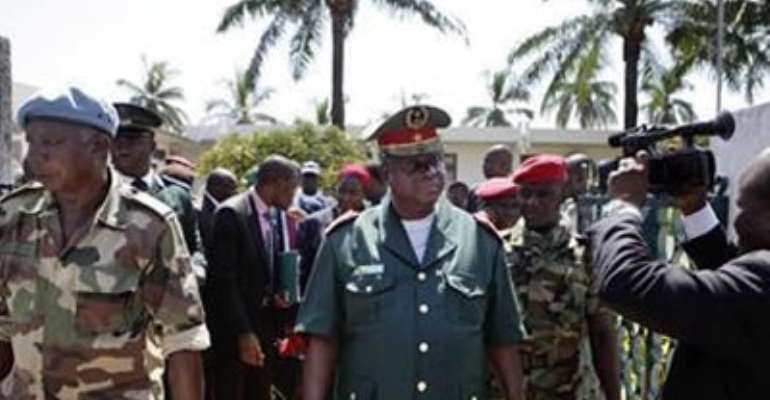U.S. Drugs Sting Muddies Guinea-Bissau Transition

A U.S. drugs sting targeting Guinea-Bissau's top military brass may freeze cocaine smuggling through the tiny West African state in the short term but could jeopardize efforts to restore order after a 2012 coup.
The U.S. Department of Justice on Thursday accused Armed Forces Chief General Antonio Indjai of plotting to traffic cocaine to the United States and sell weapons to Colombia's FARC rebels, after a months-long undercover operation that has also ensnared a former navy chief.
But Indjai - widely seen as the country's most powerful man - remains in Bissau after evading the sting and the big question is how he will react to becoming a target for American law enforcement agents.
Guinea-Bissau's caretaker government is due next month to publish a road map to elections that African and Western diplomats hope will close the book on decades of political turmoil since independence from Portugal in 1974.
"The arrests could make some of the military and political leaders very nervous and less willing to carry on with a transition that might result in their demise," said Vincent Foucher, a researcher at International Crisis Group.
"Or it could do the exact reverse and increase the leverage of those in the international community that act as the good cops," Foucher said, referring to some diplomats who have shown an interest in engaging with the existing leadership.
Repeated coups, political assassinations and a civil war in the nation nestled below Senegal on Africa's Atlantic coast, have weakened its law enforcement and paved the way for Colombian cartels to use it as a transhipment hub for tons of narcotics destined for Europe and the United States.
The country entered its latest crisis last April, when the military arrested then Prime Minister Carlos Gomes Junior and acting President Raimundo Pereira in the midst of an election that Gomes Junior was poised to win.
Indjai, who accused Gomes Junior of plotting to replace Bissau's army leadership, seized control in the wake of the putsch. He ceded power a month later to a transitional government led by a civilian president, Manuel Serifo Nhamadjo, in a deal brokered by West African regional bloc ECOWAS.
Both Gomes Junior and Pereira were forced to leave the country as part of the deal.
DRUGS TRADE
The European Union and the CPLP grouping of Portuguese-speaking nations have since refused to recognize Nhamadjo's administration, saying it remains under the control of military officials involved in the drugs trade.
Nhamadjo's government has denied any drugs links and has said the lack of support for his administration from traditional partners has hindered progress at setting elections.
Nhamadjo is in Germany seeking medical treatment for complications from diabetes. A spokesman said he could return to Guinea-Bissau within days.
Diplomatic sources said the U.S. anti-drugs operation in Bissau has already had a chilling effect on smugglers, who have for years taken advantage of weak law enforcement and a maze of offshore islands to move cocaine.
"Many people in Bissau and around the region are not sleeping very well right now. They know the Americans are watching," Jose Ramos-Horta, the United Nations' special envoy to Bissau, told Reuters.
But he said the country's leaders needed to make progress toward setting elections, preferably by the end of this year, in order to begin the process of recovery.
"The test for Bissau is now. Either it moves forward and puts its past behind it or it slips back into negativity at the expense of the people," he said.
African and Western powers are pressuring Nhamadjo to set an election date this year and to reform the existing caretaker government to be more inclusive - preconditions to any financial or technical support for the polls.
EU SUPPORT
An EU spokesman in Bissau, Piero Valabrega, confirmed the European Union would be prepared to support the elections - with an estimated price tag of $10 million - if those conditions were met, even if Nhamadjo remained president of the transition.
He said the U.S. anti-drugs operation could turn out to be positive if it weakened criminal vested interests.
"Politicians and the military will have less access to revenues from drugs smuggling and may be more likely to move the political process forward," he said.
The U.S. charges against Indjai said he planned to store FARC-owned cocaine in Guinea-Bissau and sell weapons, including surface-to-air missiles, to the organization to protect itself against U.S. military forces. Washington labels FARC (Fuerzas Armadas Revolucionarias de Colombia) a terrorist organization.
U.S. undercover agents snared Guinea-Bissau's former navy chief, Rear Admiral Jose Americo Bubo Na Tchuto, in the high-seas drugs sting on April 2 - the most high-profile score in the U.S. war on drugs in Africa.
Sources familiar with the operation say Indjai was also targeted but he dodged the planned arrest by refusing to meet the undercover agents in international waters.
Indjai cancelled a news conference scheduled in the capital on Friday and his spokesman has declined comment. He has previously denied links with drugs smuggling. Na Tchuto is in detention awaiting trial in New York, and he too has previously denied any connection to trafficking.
REUTERS
